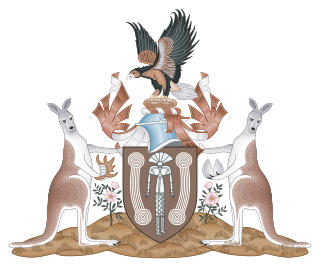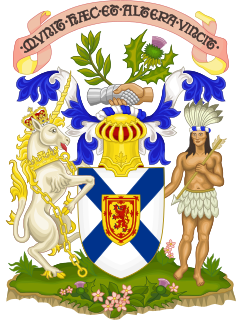The Department of Internal Affairs (DIA), or Te Tari Taiwhenua in te reo Māori, is the public service department of New Zealand charged with issuing passports; administering applications for citizenship and lottery grants; enforcing censorship and gambling laws; registering births, deaths, marriages and civil unions; supplying support services to ministers; and advising the government on a range of relevant policies and issues.
Alberta Municipal Affairs is a ministry of the Executive Council of Alberta. Its major responsibilities include assisting municipalities in the provision of local government, administering the assessment of linear property in Alberta, administering a safety system for the construction and maintenance of buildings and equipment, and managing Alberta's network of municipal and library system boards.
The Chief Minister, Treasury and Economic Development Directorate (CMTEDD) is a directorate of the Australian Capital Territory government, which advises the ACT Chief Minister, currently Andrew Barr.
Crown corporations in Canada are government organizations with a mixture of commercial and public-policy objectives. They are directly and wholly owned by the Crown.
Create NSW is a government agency of the Government of New South Wales, that falls within the Enterprise, Investment and Trade cluster. The agency was created on 1 April 2017 from an amalgamation of Arts NSW (ANSW) and Screen NSW. Create NSW is responsible for administering government policies that support the arts, artists and the various cultural bodies within the state of New South Wales in Australia, and for the provision of funding. It also provides secretarial and administrative support to the Arts & Culture Advisory Committee, a high-level committee which works with the government to help shape policy and promote the arts throughout the state.
China Wu Culture Expo Park is located in Wuxi City, Jiangsu Province, China. In July 2008, the municipal CPC committee and Government of Wuxi decided to start this program. Not only does this park contain abundant remains of Wu-Yue Culture, but also original agricultural wetland, so that it's a treasure land deserving protection and development. China Wu Culture Expo Park is intended to protect, develop, utilize and attach new contents and vitalities to the Wu Culture.
The Ministry of Heritage, Sport, Tourism and Culture Industries, was created on January 18, 2010 when the Ministry of Culture and the Ministry of Tourism were combined under one ministry. Sport was added to the portfolio in 2011. It is responsible for the development of policies and programs and the operation of programs related to tourism, arts, cultural industries, heritage sectors and libraries, in Ontario. The Ministry works in partnership with its agencies, attractions, boards and commissions and the private sector to maximize the economic, cultural and social contributions of its agencies and attractions, while promoting the tourism industry and preserving Ontario's culture and heritage.
Manitoba Sport, Culture and Heritage is the department of the Government of Manitoba responsible for managing government programs and services that support the sport, art, culture, and heritage of the province, through developing, supporting, promoting, and celebrating the identity and well-being of Manitoba and its communities.
The Ministry of Culture of Alberta, commonly called Alberta Culture, is a ministry of the Executive Council of the Government of Alberta. It was created on April 30, 2019 as Alberta Culture, Multiculturalism, and Status of Women as a new ministry merging the some of the functions of two predecessors. This is the not the first culture ministry; a previous one existed from 1971 to 1992. The current Alberta Culture is responsible for Alberta's cultural industries, arts and heritage, as well as the promotion of women's rights. In 2021 the word "multiculturalism" was dropped from the Ministry's name, but its organization remained unchanged. In 2022, the "Status of Women" was removed from the ministry's name but that portfolio stayed with the ministry with an associate minister specifically responsible, meanwhile multiculturalism was moved into a new ministry with trade and immigration.
The Department of Tourism and Recreation was an Australian government department that existed between December 1972 and December 1975.
The state agencies that form Thailand's public sector consist of several types of functioning bodies. While some agencies established by mandate of the constitution are independent, others are directly or indirectly answerable to the executive of the Royal Thai Government. The majority of these are government agencies, which employ the civil service as well as the military. Others include public organizations and state enterprises.

The Northern Territory Minister for Tourism and Culture is a Minister of the Crown in the Government of the Northern Territory, Australia. The minister administers their portfolio through the Department of Tourism and Culture.

The Ministry of Education and Vocational Training (MEFP) is the department of the Government of Spain responsible for proposing and carrying out the government policy on education and vocational training, including all the teachings of the education system except university education, without prejudice to the competences of the National Sports Council in matters of sports education. Likewise, it is also the responsibility of this Department the promotion of cooperation actions and, in coordination with the Ministry of Foreign Affairs, the promotion of international relations in the field of non-university education.
Parks and Wildlife Commission of the Northern Territory is the Northern Territory Government agency responsible for tasks including the establishment of "parks, reserves, sanctuaries and other land", the management of these and the "protection, conservation and sustainable use of wildlife."

Louisiana Department of Culture, Recreation & Tourism is a state agency and department within the Office of the Lt. Governor. The department is composed of six offices, Office of the Secretary, Office of State Library, Office of State Museum, Office of State Parks, Office of Cultural Development, and Office of Tourism.
Ministry of Health (Alberta) is a ministry of the Executive Council of Alberta. Its major responsibilities include setting "policy and direction to achieve a sustainable and accountable health system to promote and protect the health of Albertans."

The Department of Communities, Culture, Tourism and Heritage is a department of the Government of Nova Scotia that promotes arts, culture, and local heritage within the province. The department oversees three main cultural affairs groups: Acadian Affairs, African Nova Scotian Affairs, and Gaelic Affairs. They also oversee Nova Scotia Archives, Nova Scotia Museum, and Nova Scotia Provincial Library, which work with and oversee the province’s archives, museums, and libraries respectively. They also oversee Tourism Nova Scotia, which promotes the province’s tourism industry.



